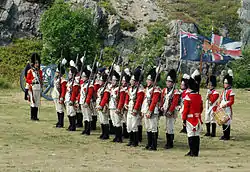United Irish Uprising in Newfoundland
The United Irish Uprising in Newfoundland began with rumours in April 1800 at St. John's, Newfoundland Colony that as many as 400 men took a secret oath of the Society of United Irishmen.[1][2] The recent Irish Rebellion of 1798 had inspired some of the Irish people in the Newfoundland Colony to plan and organize a rebellion.[1][2] This included soldiers located at Signal Hill, Fort William, and Fort Townshend.[1][2] It was suspected that as many as eighty soldiers planned to meet and mutiny against the British Army.[1][2]

Outcome
The British Army captured all of the members of the uprising except the two ring leaders leading to capital punishment for some of them.[1][2]
Aftermath
The uprising left several implications for the Irish and for British governance of Newfoundland.[1][2] It was the first time such an uprising had occurred in Newfoundland and the British feared it would not be the last occurrence.[1][2] The British officials in the Colonial Office considered Newfoundland to have a reputation as a "Transatlantic Tipperary", a distant but semi-Irish colony with the potential for political turbulence.[1][2]